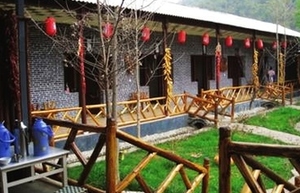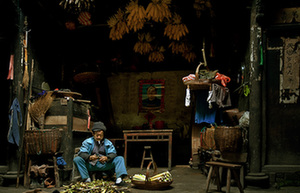At first glance, the narrow, long-winding dirt road that leads to Chashan village looks no different from anywhere else in rural China. But the lush green meadows, herds of livestock grazing contentedly, and rows and rows of gray cement kiwi fruit trellis on either side of the road that you chance upon after arrival in the village have a different story to tell.
It is the story of how a few resolute individuals beat the odds to put the remote rural village in mountainous Xiuwen county, in Southwest China's Guizhou province, at the forefront of sustainable rural development in China.
"Eight parts hills, one part water and one part land" is how the rugged terrain of Guizhou is often referred to in China.
Despite its rich flora and fauna, Guizhou is considered to be one of the most economically backward and underdeveloped provinces in China. But Chashan begs to differ and wants to be known for using modern, sustainable agricultural techniques to make a big difference.
Though the village is still steeped in the old, there are visible signs of modernity. Visitors undergo sanitization procedures at a spray sterilization room before they are allowed to see the 400 dairy goats that are grazing in the lush grassland at the foot of a hill.
Though grazing reduces milk out-put by 30 percent, compared with raising goats in confinement, the villagers believe that the New Zealand-style of breeding will give it the coveted high-end green product tag. Further evidence of modernization is visible in the form of the New Zealand-designed Waikato system used to milk the goats.
The dairy farm is part of Guiyang Shengheng Ecological Agriculture Development Co Ltd, an agricultural startup established by four young professionals who gave up their promising urban careers for a tryst with the unknown in the relatively undeveloped Chashan.
The four young executives of Shengheng, all born around 1980, style themselves as real-world "Chinese rural partners".
Ning Weihua, 34, Shengheng's chairman as well as head of Chashan village, recollects the early days when he invited several agricultural experts to discuss the way forward for Chashan and the road it should take for sustainable development.
According to Ning, the experts were unanimous in the opinion that Chashan should use its natural resources to full advantage. The road map outlined by these experts hinged on increasing farming and developing leisure agricultural tourism.
"Cities are for making a living and countries are for living a life," said Ning. He said that his goal is to ensure that Chashan has a modern infrastructure without sacrificing its idyllic country life.
That was something easier said than done, said Ning, adding that his first task was to conduct an opinion poll among the village's 284 house-holds on the kind of jobs and the remuneration they expected.
"We provided job options such as cattle breeding, dairy goat raising, rural tourism, bed and breakfast, support crews and construction. The expected remuneration of farmers for these jobs ranged from 5,000 yuan ($800) to 72,000 yuan per year.
Ning said they want to help the villagers build competitiveness to sustain themselves by taking the agricultural development route for growth.
|
 |
 |
| Shanxi promotes rural tourism | A glimpse of rural life shows changing face of China |
